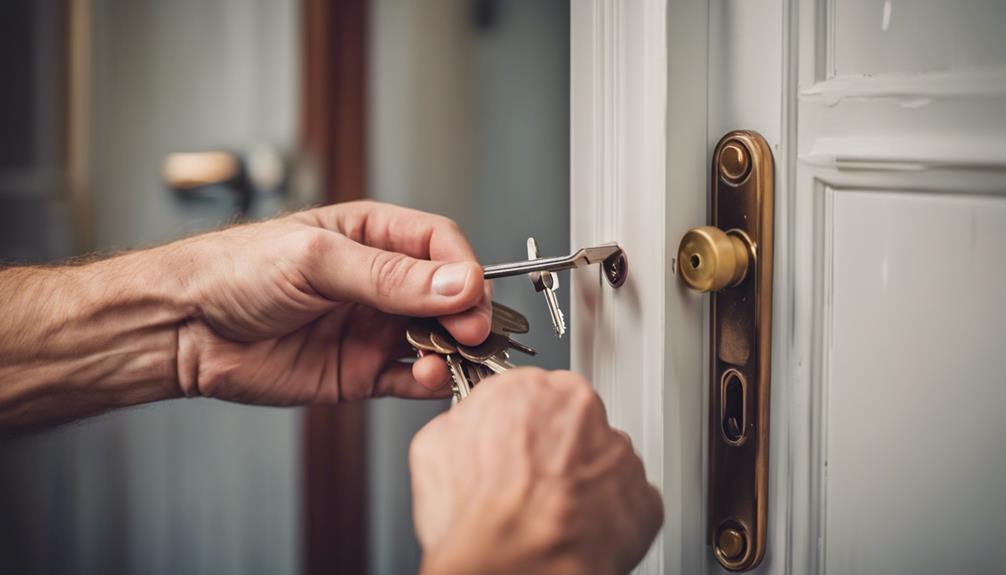When you're re-keying rental properties, you need to take into account tenant rights and landlord responsibilities. Landlords must provide written notice before changing locks, typically 24-48 hours in advance, ensuring tenants feel secure. Make sure your lease agreement covers lock management and access policies clearly. Regular communication enhances trust and compliance with local laws. Always keep detailed records of key management and notify tenants about any changes, especially regarding security deposits. Remember, understanding these aspects fosters a smooth rental experience, and there's more essential information to explore on this topic.
Key Takeaways
- Landlords must rekey locks after a tenant moves out to ensure property security and comply with legal obligations.
- Tenants should receive written notice regarding rekeying, including reasons, timelines, and access procedures, to foster transparency.
- Local laws often require 24-48 hours' notice before changing locks, allowing tenants to prepare adequately.
- Accurate record-keeping of key distribution and rekeying activities is essential for compliance and dispute prevention.
- Hiring professional locksmith services is advisable to ensure effective rekeying and adherence to legal standards.
Tenant Rights and Access
Understanding tenant rights and access is essential for both landlords and tenants. When it comes to tenant lock rekeying, you need to know that tenants have the right to feel secure in their homes. According to state laws, landlords often have a legal obligation to rekey locks after a tenant moves out, guaranteeing the security of the new occupants legal obligations to rekey locks.
If you've recently moved in or had a change in circumstances, rekeying your locks can be a sensible step for your peace of mind. However, it's important to communicate with your landlord about this process.
Landlord rekeying rights allow landlords to change locks for safety or maintenance reasons, but they must provide proper notice to tenants. Generally, they should inform you in advance and specify why the rekeying is necessary. This guarantees transparency and maintains trust within your rental relationship.
Understanding the legal rekeying rental properties guidelines can help you navigate these situations. Tenants should always verify their rights and responsibilities regarding locks and access, as this knowledge fosters a cooperative environment.
Landlord Responsibilities
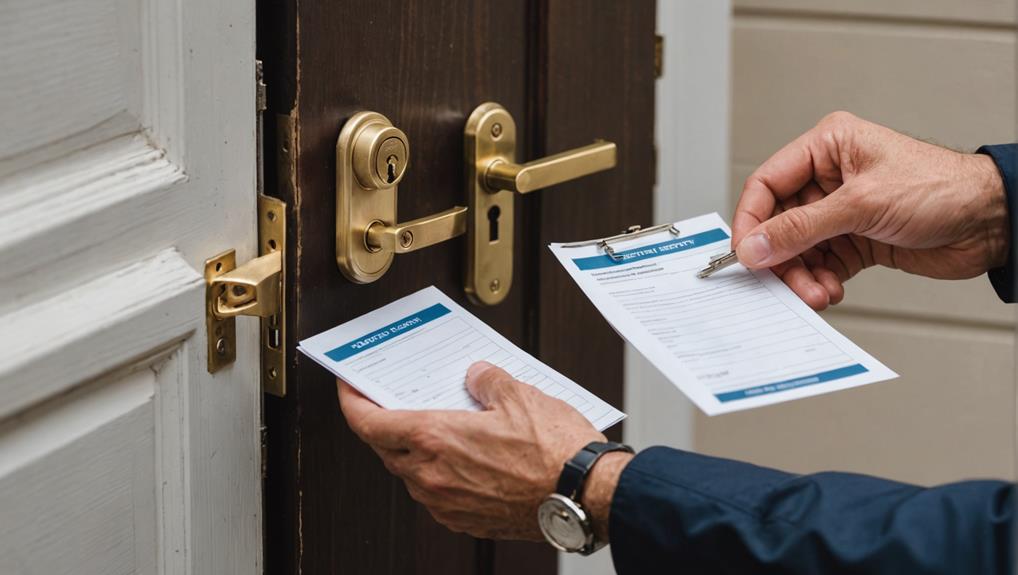
As a landlord, you've got important responsibilities to guarantee your property is safe and compliant with the lease agreement.
This includes understanding your obligations for lock replacement and guaranteeing that all entry points are secure to protect your tenants.
You need to prioritize tenant safety and keep up with any notification requirements, as outlined in landlord-tenant laws.
Understanding these obligations can help you maintain a positive rental experience for everyone involved.
Tenant Safety Obligations
Creating a safe living environment is a fundamental responsibility of every landlord. You've got to guarantee that your tenants feel secure in their homes, and this starts with understanding rekeying rental property laws. When a tenant moves in or out, it's crucial to change the locks or rekey the property to prevent unauthorized access. This not only protects your tenants but also shows that you care about their well-being.
Additionally, you should clearly communicate your policies regarding security deposit rekeying. Many tenants expect that their security deposit will cover the cost of new locks, so it's wise to outline this in your lease agreements. Transparency about these procedures helps build trust and demonstrates your commitment to their safety.
Regular property inspections are also essential. By keeping an eye on potential hazards and addressing them promptly, you create a safer environment.
Lease Agreement Compliance
When it comes to lease agreement compliance, landlords must adhere to the terms outlined in the contract to guarantee a smooth rental experience. By doing so, you not only protect your interests but also foster trust and respect with your tenants.
Every detail in the lease matters—whether it's maintenance responsibilities, payment schedules, or pet policies. Make sure you're familiar with all provisions and follow through on your commitments.
If you've agreed to handle repairs within a specified timeframe, stick to it. Timely communication and action show your tenants that you value their needs, which can lead to a more harmonious living situation.
Additionally, be proactive in addressing any potential issues before they escalate. Regularly reviewing your lease agreement can help you stay compliant and avoid misunderstandings.
Notification Requirements
To assure a positive rental experience, landlords must understand and fulfill their notification responsibilities. When you decide to re-key a rental property, it's vital to inform your tenants about the change. Clear communication fosters trust and guarantees everyone is on the same page.
Typically, you should notify tenants in writing, detailing the reasons for the re-keying and the timeline for when it'll occur. This allows them to plan accordingly and guarantees they'll have access to their home. Depending on your local laws, you may also need to provide notice before entering the property for the re-keying process.
Remember, transparency is key. Your tenants will appreciate knowing that you're taking their security seriously. Make it a point to discuss any new keys or changes to access procedures, so they feel included and secure in their living environment.
Lastly, keep documentation of your notifications. This can serve as a reference in case any disputes arise. By adhering to your notification responsibilities, you not only comply with legal obligations but also create an atmosphere of respect and care, enhancing the overall rental experience for both you and your tenants.
Lease Agreement Provisions
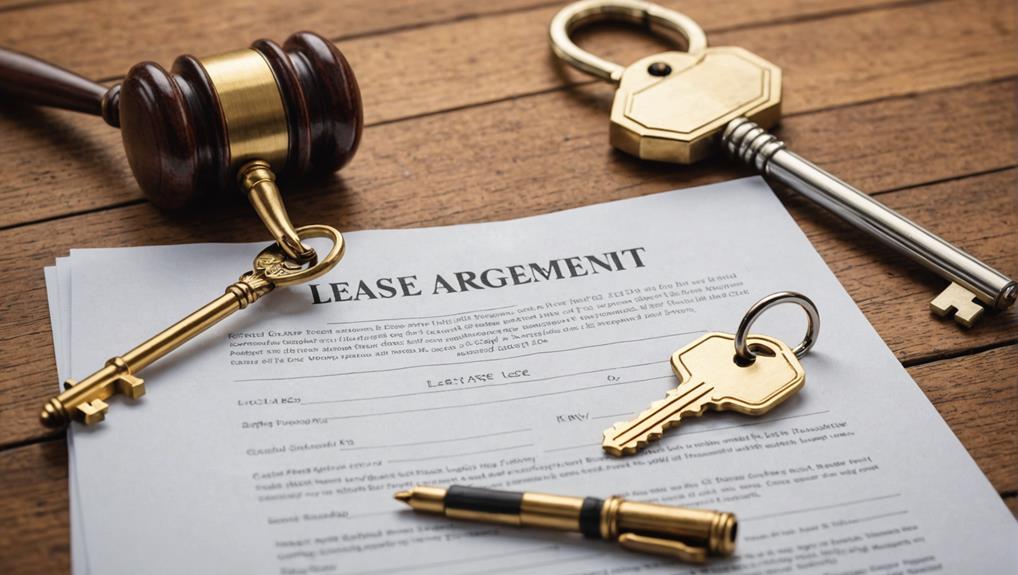
A well-crafted lease agreement is essential for both landlords and tenants, as it clearly outlines the rights and responsibilities of each party. When setting up your lease, be sure to include specific provisions regarding key management. This means addressing how often you'll re-key the property and under what circumstances, like after a tenant vacates.
It's also important to contemplate the security implications of key management, as essential tips for re-keying locks can greatly enhance tenant safety.
You'll want to define who's access to keys and how tenants can request additional keys. Reflect on adding a clause about the cost of key replacements, ensuring tenants understand their responsibilities if keys are lost or damaged. This clarity will help build trust and reduce misunderstandings.
It's also wise to include a provision about the process for re-keying the property. Outline how and when this will occur, and specify that tenants shouldn't change locks without your permission. By being transparent about these policies, you foster a positive relationship and promote a sense of security for tenants.
Lastly, make sure to review your lease agreement regularly. Laws change, and updating your provisions can help maintain compliance and protect everyone involved. A clear lease serves everyone's best interests and paves the way for a harmonious renting experience.
Notice Requirements
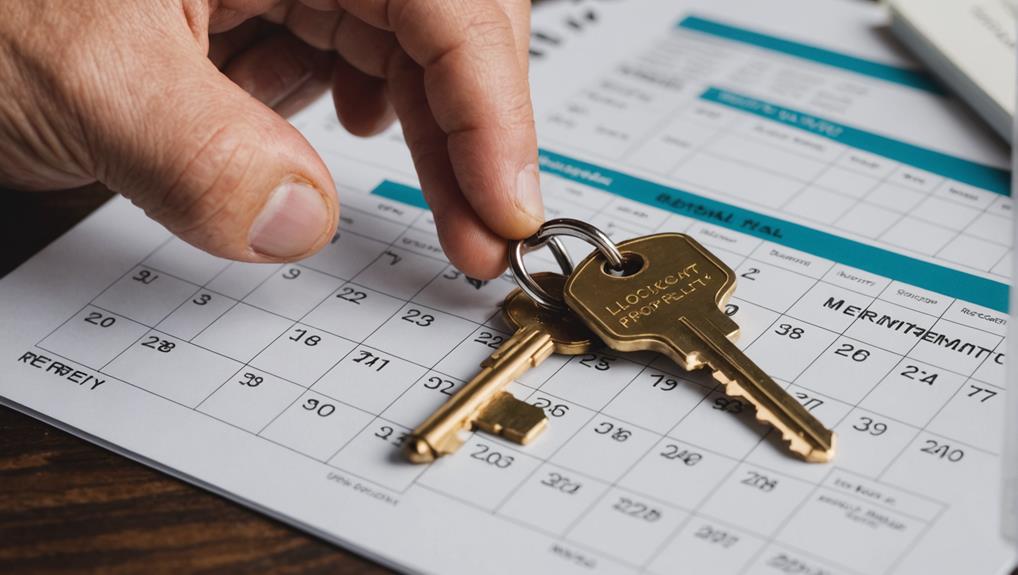
When you're managing rental properties, understanding notice requirements is essential.
Proper notification guarantees that tenants are aware of any changes, including re-keying, which can affect their security and peace of mind.
You'll need to be aware of your obligations to notify tenants and the timing for those notices.
Failing to follow these rules can lead to misunderstandings and legal complications, especially if the costs of re-keying become a point of contention between landlords and tenants, as discussed in navigating disputes.
Tenant Notification Obligations
Understanding tenant notification obligations is vital for both landlords and tenants. When you decide to re-key a rental property, it's important to communicate effectively with your tenants. Clear communication fosters trust and guarantees everyone is on the same page.
As a landlord, you're required to inform your tenants about the change in locks. This notification should include the reason for the re-key and any new access procedures. It's not just about following the law; it's about respecting your tenants' right to feel secure in their home.
While specific notice requirements can vary by jurisdiction, providing written notice is generally a best practice. This gives your tenants a record of the communication, which can help avoid future misunderstandings.
Timing of Notices
Timing is crucial when it comes to notifying tenants about changes or important matters regarding their rental property. You want to make certain your tenants feel secure and informed, especially when it involves re-keying the property.
Typically, local laws require you to provide tenants with prior notice, often ranging from 24 to 48 hours, depending on your jurisdiction. Make certain you check your state's specific regulations to avoid any legal pitfalls.
It's best to communicate these changes as soon as possible, allowing your tenants ample time to prepare. A well-timed notice fosters trust and transparency, which are fundamental in maintaining a positive landlord-tenant relationship.
When drafting your notice, be clear and concise. Include the date and time when the re-keying will occur, the reason for the change, and any instructions your tenants need to follow.
If you can, follow up with a personal message or call to reassure them. Remember, your goal is to serve your tenants well, making them feel valued and respected throughout the process. Taking the time to notify them properly can go a long way in building a strong and cooperative rental environment.
Emergency Access Clauses
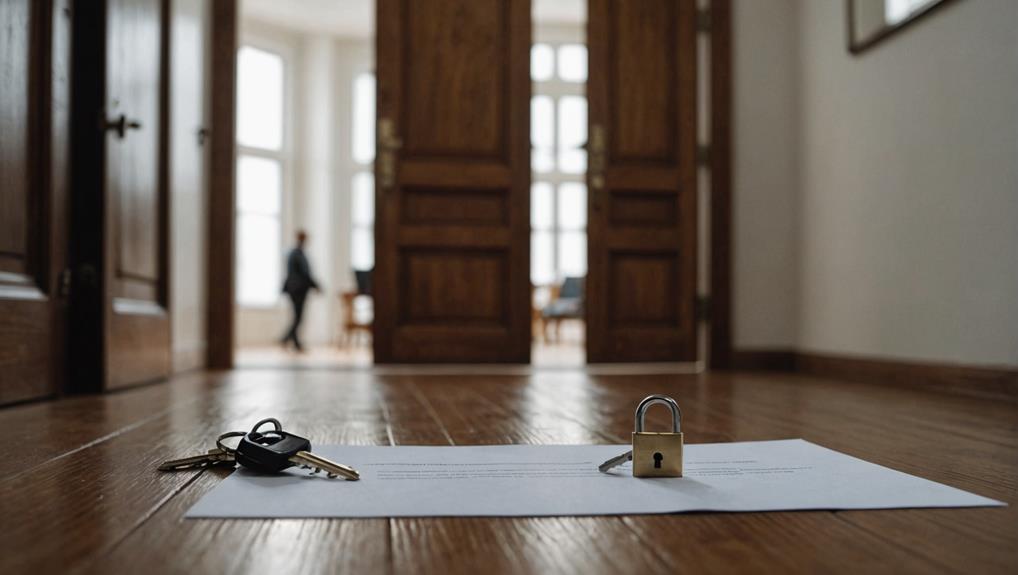
Emergency access clauses are vital for both landlords and tenants, as they outline the conditions under which a landlord can enter a rental property without prior notice. These clauses typically come into play during emergencies, like fire, flood, or a gas leak, where immediate action is necessary to protect life and property.
Confirming that the property is secure with reliable locks is also important, as this can prevent unauthorized access during emergencies, reinforcing the significance of essential lock replacement for business security.
As a landlord, you want to make sure that your tenants feel safe and secure in their homes. By including clear emergency access provisions in the lease, you help foster that trust.
It's important to specify what constitutes an emergency and the steps you'll take to notify the tenant when possible. This transparency not only protects you legally but also reassures tenants that you respect their space.
Tenants, on the other hand, should understand their rights regarding emergency access. Knowing that your landlord can enter in urgent situations can provide peace of mind, especially during crises.
Open communication about these clauses can create a respectful relationship, making certain both parties are on the same page. Ultimately, well-crafted emergency access clauses serve to protect everyone involved, promoting safety and cooperation in the rental environment.
Security Deposit Implications
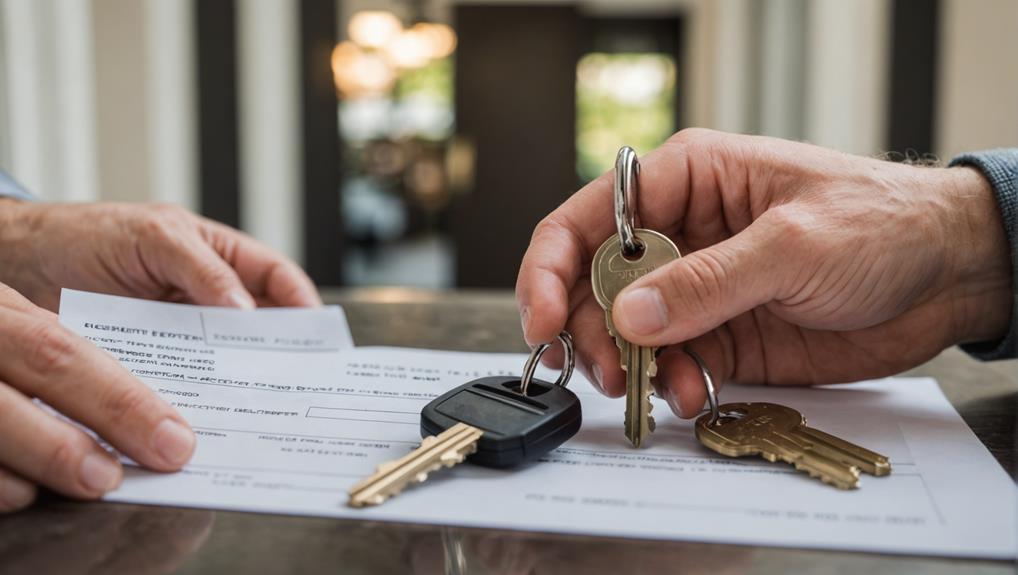
Security deposits play an important role in rental agreements, providing landlords with financial protection against potential damages or unpaid rent.
When you re-key your rental property, it's vital to take into account how this action might affect the security deposit. If you're changing locks for safety or compliance reasons, it's generally a positive step that tenants will appreciate.
As a landlord, it's also important to be aware of important tips for landlords regarding the process of replacing locks. However, you'll want to communicate these changes clearly to your tenants.
Before re-keying, let your tenants know about the timeline and any new key distribution plans. This transparency fosters trust and reassures them that their security is a priority.
Remember, if the locks are changed, you're responsible for providing new keys promptly. Failing to do so can lead to frustration and may even affect their perception of your reliability as a landlord.
When tenants move out, inspect the property for any damages that may have occurred. If you find issues that necessitate deductions from the security deposit, document everything thoroughly.
Clear communication about these deductions, along with any supporting evidence, will help maintain a good relationship with your tenants and guarantee compliance with legal standards.
Local Laws and Regulations
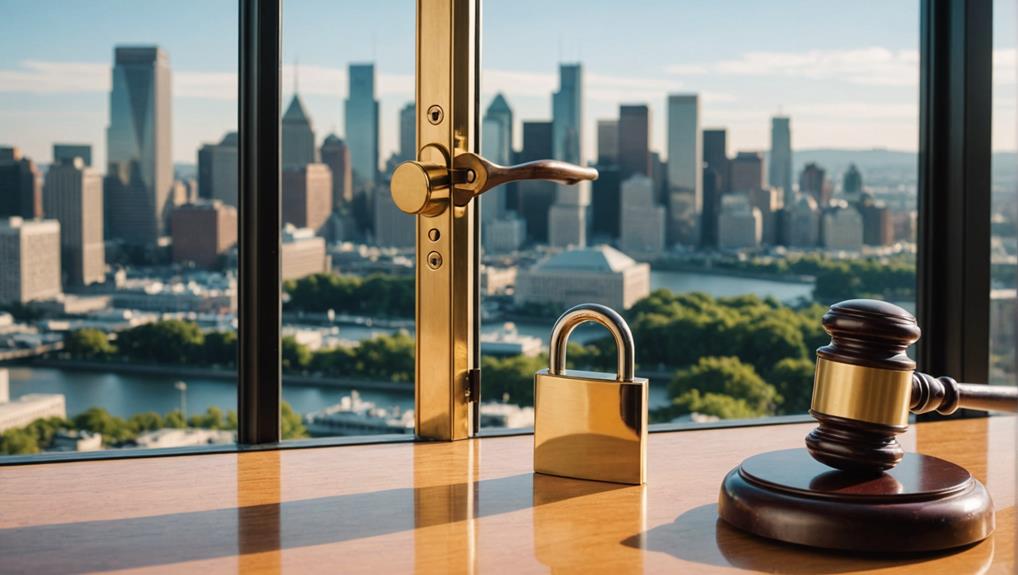
Understanding local laws and regulations is vital for any landlord managing rental properties. These laws can vary greatly from one jurisdiction to another, so it's important to familiarize yourself with your local requirements before re-keying your properties. Not only does this help guarantee compliance, but it also fosters a positive relationship with your tenants.
Here's a quick overview of some common local regulations:
| Regulation | Description |
|---|---|
| Tenant Notification | Some areas require you to inform tenants before changing locks. |
| Key Duplication Restrictions | Certain jurisdictions may limit who can duplicate keys. |
| Security Requirements | Local laws might dictate specific security features for rental properties. |
Professional Services Considerations
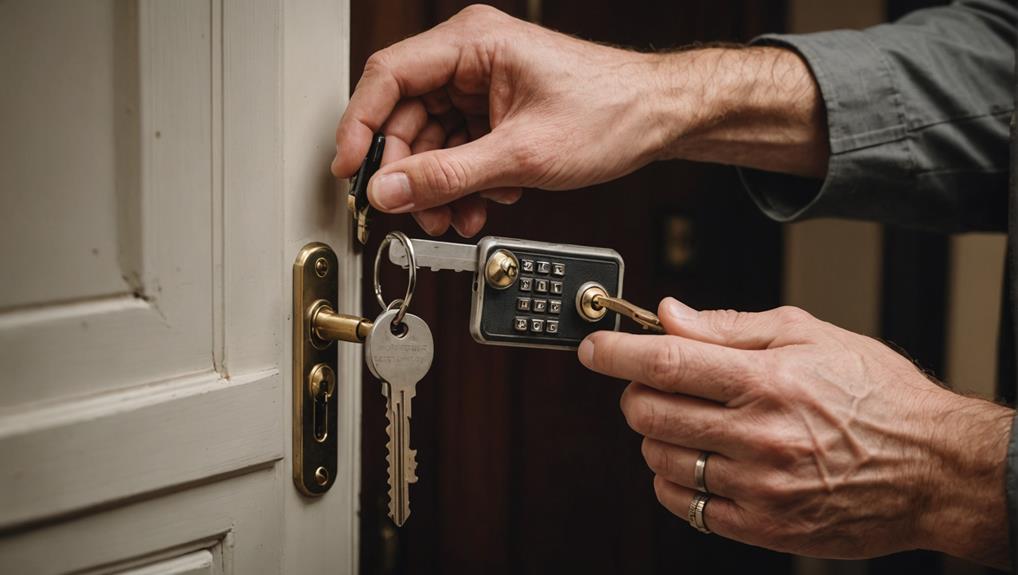
When managing rental properties, hiring professional services can streamline your operations and assure compliance with legal obligations. Engaging locksmiths who specialize in rental properties guarantees you're not only re-keying effectively but also adhering to safety standards and local laws.
These experts understand the nuances of rental regulations, so you can focus on serving your tenants without legal worries. It's crucial to avoid cheap locksmith services, as they may compromise your property's security and lead to potential liabilities the risks of low-cost services.
Additionally, consider employing property management services. They can help coordinate the re-keying process, assuring all units are secure and ready for new occupants promptly. This not only enhances tenant satisfaction but also protects your investment.
You might also want to consult legal professionals who specialize in real estate. They can provide valuable insights on tenant rights and responsibilities regarding security and access, which can prevent potential disputes down the line.
Ultimately, leveraging professional services isn't just about efficiency; it's about fostering a safe and welcoming environment for your tenants. By investing in expertise, you're demonstrating your commitment to their well-being while safeguarding your property's integrity.
This approach not only benefits you but also enhances the overall rental experience for everyone involved.
Record Keeping Practices
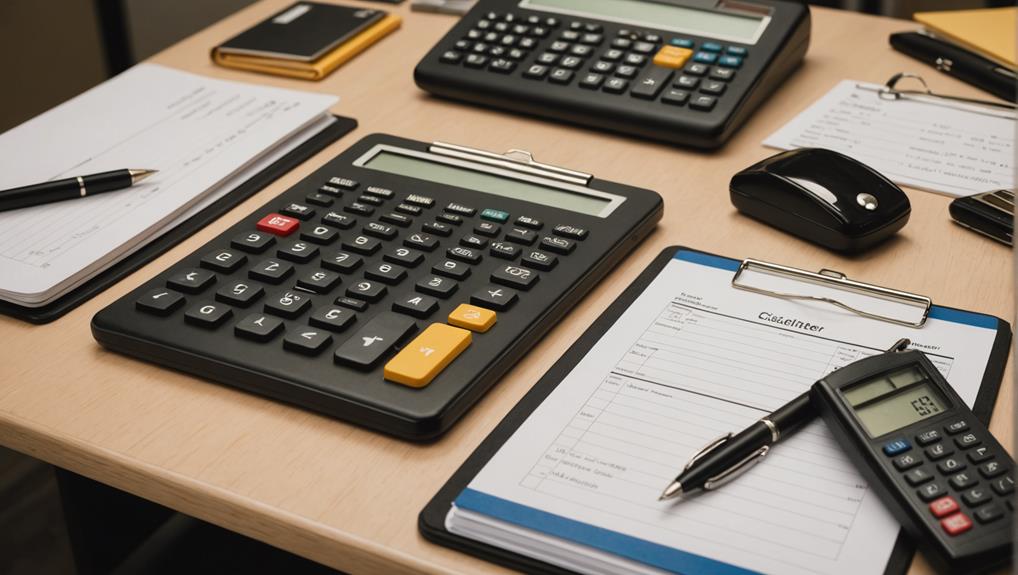
Effective management of rental properties goes beyond hiring professionals; it also involves maintaining accurate records. When you re-key a property, documenting each step is essential to enhancing security in shared spaces.
Keep a log of when you changed the locks, the reasons for re-keying, and any communications with tenants regarding this process. This record helps protect you in case of disputes, especially in multi-unit residential and commercial buildings where access is shared important security practices.
You should also maintain a detailed inventory of all keys distributed. Note who received keys and when, as well as any lost keys and the actions taken in response. This guarantees that you always know who's access to your property, enhancing security for both you and your tenants.
Additionally, consider implementing a digital record-keeping system. It can simplify tracking changes and provide easy access to essential information when needed.
Regularly review and update your records to confirm they remain accurate and relevant.
Frequently Asked Questions
Can Tenants Change Locks Without Landlord Approval?
You might be wondering if you can change the locks without your landlord's approval.
Generally, it's best to check your lease agreement first, as it often outlines your rights regarding modifications.
If you change the locks without permission, it could lead to potential disputes.
Communicating with your landlord about your concerns can help you find a solution that guarantees your security while maintaining a good relationship.
Always seek a mutual understanding!
What Happens if a Tenant Loses Their Key?
Imagine walking into your home only to realize you've lost your key.
Panic sets in, but don't worry! You can often call a locksmith or your landlord for help. They might provide a spare key or change the locks, depending on your agreement.
Just remember, it's important to keep your landlord in the loop about lost keys, as they can help guarantee your home stays secure and your peace of mind remains intact.
Are There Costs Associated With Re-Keying Properties?
Yes, there are costs associated with re-keying properties.
You'll need to factor in the price of new locks and keys, which can vary depending on the type and security level you choose.
If you hire a locksmith, their labor charges will add to your expenses.
It's smart to budget for these costs, as they help guarantee your property remains secure and your tenants feel safe in their home.
How Often Can Landlords Re-Key Rental Properties?
You can re-key rental properties as often as you think necessary, especially when tenants move in or out.
Imagine feeling secure knowing each new tenant has a fresh start without the worry of old keys floating around. Regular re-keying enhances safety and tenant trust.
It's a proactive approach that shows you care about their well-being. Just keep in mind any lease agreements or local guidelines that might influence how frequently you do this.
Can a Tenant Request a Master Key?
If you're a tenant, you might wonder if you can request a master key for your rental unit.
Generally, it's a good idea to discuss this with your landlord first. They may have policies regarding access and security that you'd need to take into account.
Open communication can help you understand their viewpoint and your options.
Just remember, safety and trust are key when it comes to sharing access to your living space.
Conclusion
In the world of rental properties, keeping the keys safe is just as important as keeping the peace. As the saying goes, "An ounce of prevention is worth a pound of cure." By understanding tenant rights, landlord responsibilities, and local laws, you'll protect both your interests and your tenants' well-being. Always communicate clearly and keep thorough records to avoid misunderstandings. With these considerations in mind, you can create a secure and harmonious living environment for everyone involved.

